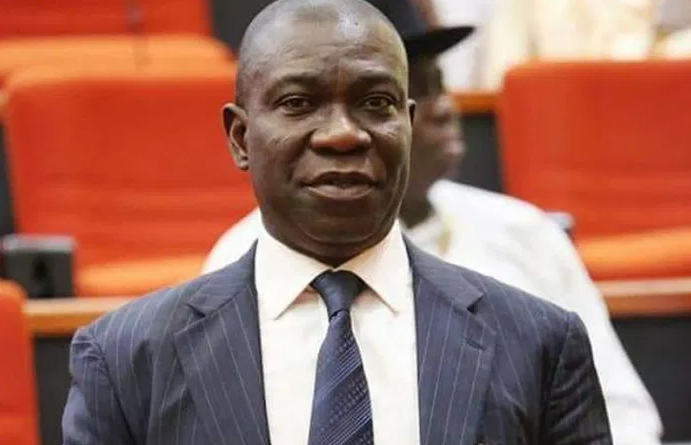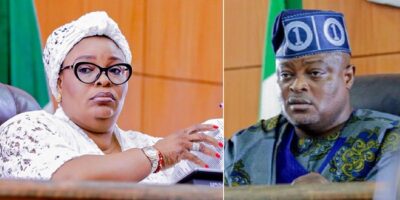Create Pathway To New Constitution, Ekweremadu Charges NILDS

Former Deputy President of the Senate, Senator Ike Ekweremadu, on Friday tasked the National Institute for Legislative and Democratic Studies, NILDS, on creating a pathway for the making of a new constitution.
Ekweremadu made the call in a paper entitled “Constitution Amendment: Fostering Greater Involvement of NILDS”, which he delivered at a capacity building programme for Research Fellows of the Institute in Abuja
He said whereas Section 9 of the Constitution empowers the parliament to amend the constitution, the process, in reality, was not as easy as it appears to some onlookers.
According to him
Constitution amendment is the single most important and rigorous lawmaking power of the Nigerian legislature.
I had the rare privilege of piloting the process in the 6th, 7th, and 8th Senate, and I can affirm that it is not only rigorous, but enmeshed in convoluted politics, Nigeria being a pluralistic society. It was therefore not surprising that every attempt to amend the Constitution between 1999 and 2007 did not succeed until we took over in the 6th National Assembly.
Ekweremadu, however, stressed that NILDS could be very relevant to the constitution amendment process by building the capacity of members and support staff of Constitution Amendment Committees of the National and State Assemblies and by championing the procedure for creating a new Constitution.
He said:
The Constitution has undergone several amendments since 2010. The global best practice is that when a law undergoes so many amendments, you repeal and re-enact it, just as we are currently doing to the Electoral Act.
However, the manner the provisions of 1999 Constitution can be altered is already circumscribed in the document and it permits only amendments. It does not provide for how it could be repealed and a new one
We tried in the 7th National Assembly to make provisions for how a new constitution could be brought into being. That proposed amendment included a referendum. That was what countries like Brazil, Kenya, etc. did. Unfortunately, somehow, it didn’t work. It was voted out and rejected. But I think this is a cause NILDS should pursue. It is in a position to lead the advocacy for the streamlining of the provisions of the Constitution by laying foundation for the procedure for creating a new Constitution,
he said.
The ranking Senator however, emphasised the need for NILDS to build its capacity and the need for the completion of NILDS permanent site for the Institute to be in a position to play such crucial roles in the constitution amendment process.
Ekweremadu, highlighted more than 15 major amendments to the constitution under his stewardship, including financial and administrative autonomy for the Independent National Electoral Commission (INEC), financial autonomy for the National Assembly as well as State Legislature and Judiciary, reduction in the age requirement for political offices, timeline for the filing and disposal of pre and post election matters, among others.
The Chairman of the Senate committee on Environment, however, regretted that the executive failed to sign more than 21 amendments by the National Assembly and also ratified by the State Assemblies to significantly improve the nation’s federalism and democracy.
These, he said, included: devolution of Railway, Aviation, Power, Stamp Duty etc. from Exclusive List to Concurrent List; compulsory savings of a defined percentage of oil revenues for rainy days; separation of the Office of the Attorney General of the Federation/State from the Office of Minister/Commissioner for Justice (including security of tenure and financial autonomy for the Office of the Attorney-General); inclusion of basic education and primary healthcare in fundamental and justiciable human rights; independent candidates; inclusion of electoral offences as grounds to disqualify candidates from future election; mandatory presentation of yearly State of the Nation address to a joint session of National Assembly by the President; straightening the processes for state creation; removal of presidential assent to constitution amendment Bills as is the case in the US; and financial autonomy for Office of the Auditor-General of the Federation to make it more independent.
Others include: amendments compelling the President/Governor to transmit assent/veto of a Bill to parliament within 30 days (it is 10 days in the US), failing which such Bill becomes law automatically; sanction for disobeying legislative summons; time frame for submission of ministerial nominees, including their respective portfolios; and provisions to protect and enhance the rights and well-being of people living with disability, among others.
Ekweremadu, added that while amendments to reform of local government system, including the infusion of financial autonomy, uniformity of tenure, and better electoral process in the election of Councils were consistently rejected by the State Assemblies, proposed key amendments such as procedure for the enactment of an entirely new constitution, creation of state police, single term for President and Governors, abrogation of the immunity clause, and removal of the Land Use Act were all voted out at the level of the National Assembly.
He listed ethno-religious and sectional politics, lack of political will, inexperience and lack of template of procedure, crisis of expectation and the temptation to do so much at a time, apathy on the part of the masses and lack of democratic culture, and lack of independence of critical institutions, among others, as major challenges faced in constitution amendment processes.

Justin Nwosu is the founder and publisher of Flavision. His core interest is in writing unbiased news about Nigeria in particular and Africa in general. He’s a strong adherent of investigative journalism, with a bent on exposing corruption, abuse of power and societal ills.













